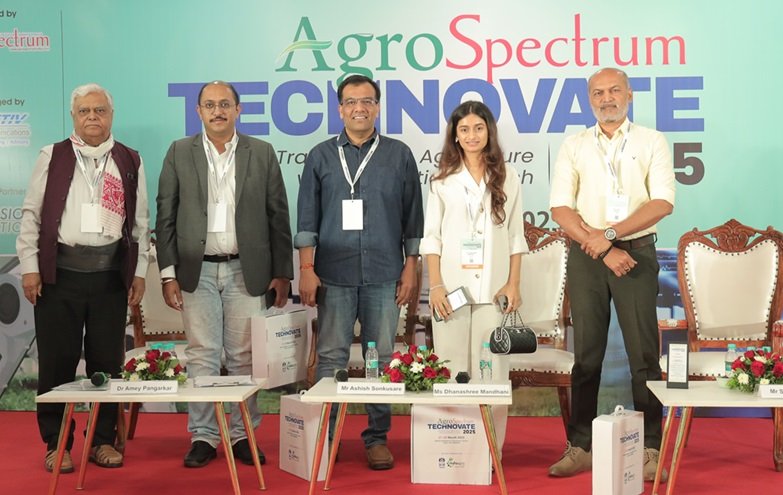Thursday, 19 February 2026

The panel discussion on future ready farming recommended roadmaps for new age agriculture by leveraging AI & Big Data. The panelists included Dr Amey Pangarkar, Marketing and Gen AI Consultant, Aconsultancy; Ashish Sonkusare, CEO & Founder, eVerse.AI; Dhanashree Madhani, Founder & CEO, Salaam Kisan; Sanjay Borkar, CEO, CoFounder, FarmERP
Speaking on leveraging artificial intelligent for sustainable farming, Ashish Sonkusare, CEO & Founder, eVerse.AI highlighted that despite India being the largest producer of milk, income of dairy farmers is the lowest. He also mentioned about ground-breaking project, the Maharashtra Methane Program aiming to lower methane emissions from 20 million cattle population of Maharashtra. The program’s goal is to reduce methane emissions from enteric fermentation and manure by 30 per cent through feed additives application, strategically as a part of the intervention. Through Greencow.earth, the Government has partnered with eVerse.AI to support this endeavor and track and monitor the program’s advancement. This creative strategy not only reduces the effects of climate change but also gives farmers the chance to increase their revenue by selling carbon credits, encouraging sustainable farming methods and raising living standards. Infact, eVerse.AI has pioneered technological interventions in livestock segment through the launch of CowGPT—the first generative AI application in the world. In order to develop and train their own foundation model, the organization has also worked with academic institutions and research centers in the United States and India. Through the ConnectedCow app and web platform, as well as a straightforward WhatsApp chat interface, the product can be utilized in a variety of ways.
Speaking at Technovate 2025, Dhanashree Madhani, Founder & CEO, Salaam Kisan highlighted the bottlenecks towards achieving sustainability in terms of low yield, disruption of market linkages etc. She emphasized on the fact that AI is intended towards helping smallholders. Infact, demonitisaton of data driven agri is the need of the hour, besides the generational and traditional knowledge of farmers. For instance, Neem spraying on cotton can be done using drones, as a part of new age technologies in agriculture. Alongside the cutting edge, Salaam Kisan’s precision farming recommendations optimize farmer productivity while reducing expenses. For precision planting, chemical application, and drone-based remote sensing, the technical solutions offer both historical and real-time data analysis.
Speaking on the dynamic technology landscape in agriculture sector, Sanjay Borkar, CEO, CoFounder, FarmERP stated, that growth in agribusiness comes with major challenges in market expansion, operations, finance, and technology. Businesses must tackle issues like tough competition, supply chain disruptions, climate change, and rising production costs. Additionally, agribusinesses need to manage regulatory compliance, changing consumer demands, and cybersecurity risks while staying ahead of competitors. Sanjay clearly highlighted on how digital transformation has emerged as essential in the rapidly shifting surroundings of today. By improving existing assets and operational efficiency, artificial intelligence is leading the way in the revolution of digital agriculture. Utilization of technology, therefore reduces inefficiencies, expedites procedures, and offers real-time insights—all without raising the expenditure. It assists in streamlining all facets of your organization, from sales to farm operations, allowing it to grow more quickly and intelligently without having to make ten times as much investment in infrastructure or resources.
Discussing further, Sanjay also mentioned how data accuracy is the basis of building right information. Unpredictable weather, changing markets, and increased compliance requirements are all challenges for agribusinesses. Inefficiencies and missed opportunities result from manual procedures and disjointed data. It is here that AI comes into picture